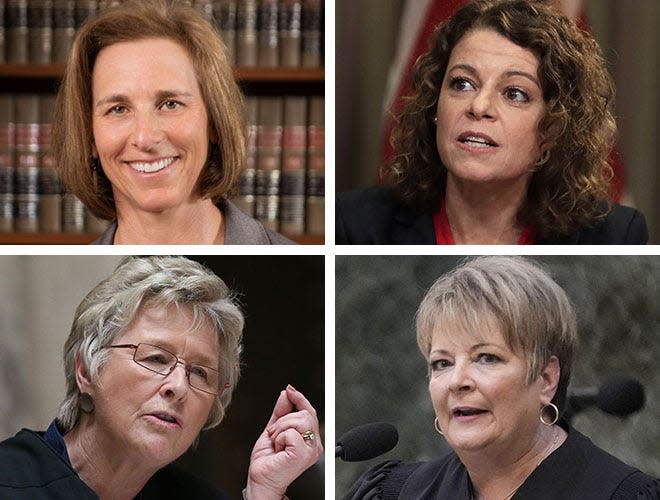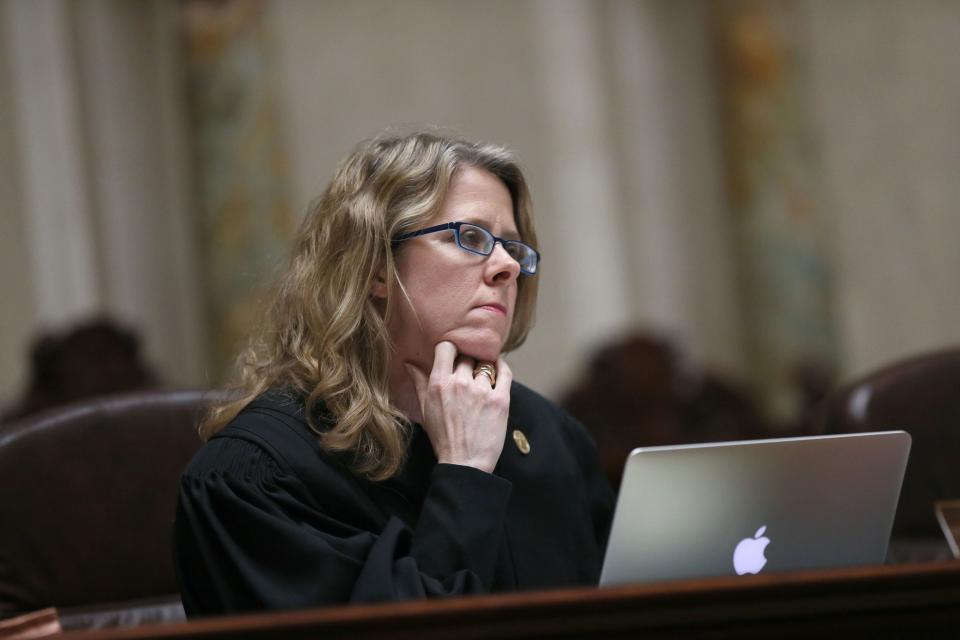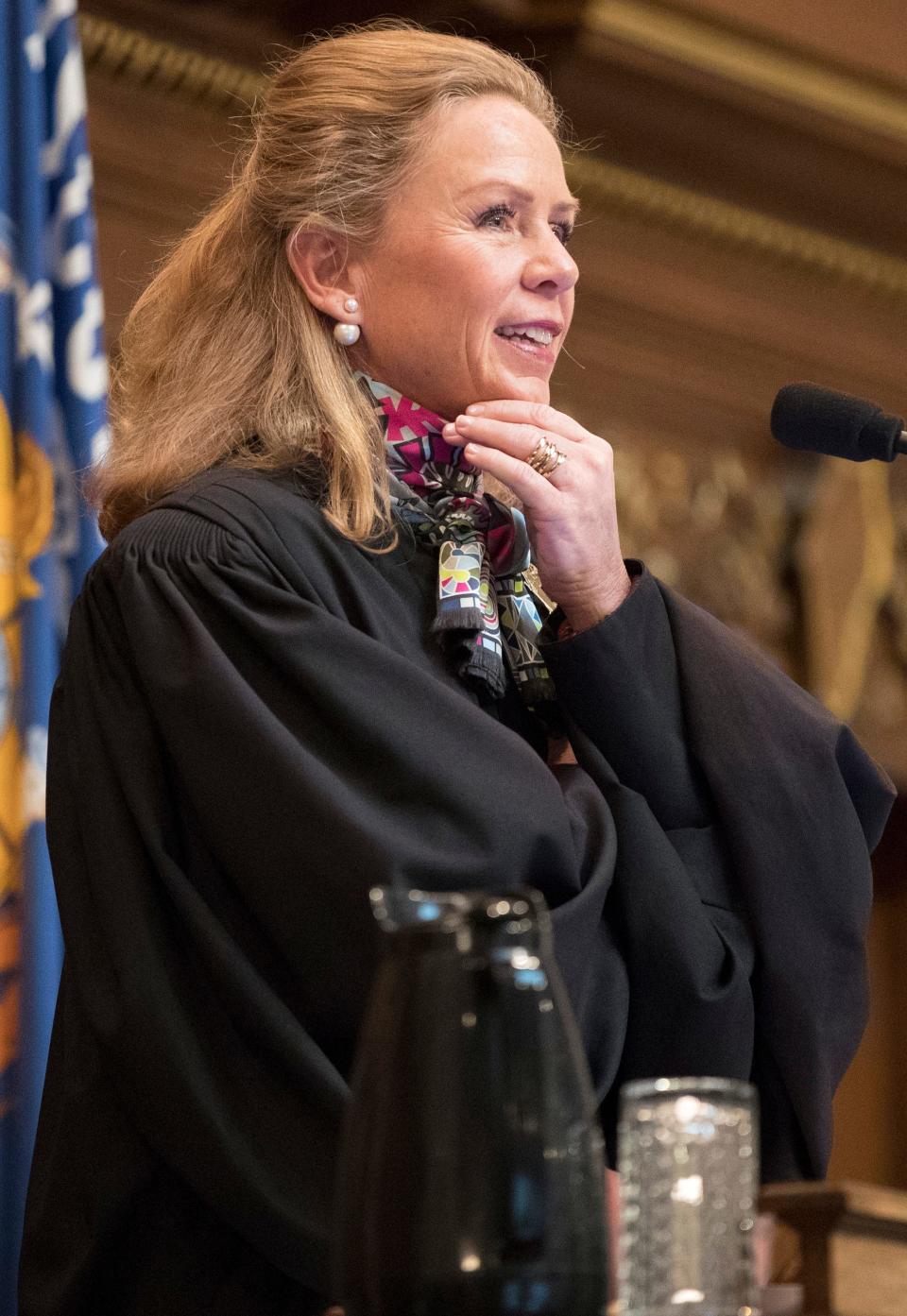Rancor flares on the Wisconsin Supreme Court as its new liberal majority moves to blunt the chief justice's power

- Oops!Something went wrong.Please try again later.
- Oops!Something went wrong.Please try again later.
- Oops!Something went wrong.Please try again later.
- Oops!Something went wrong.Please try again later.
- Oops!Something went wrong.Please try again later.
MADISON – Three days after securing a new majority on the Wisconsin Supreme Court, the court's four liberal justices voted to limit the power of its conservative chief justice — a move the leader called "an attempt to gut" her constitutional authority by "rogue justices."
In response, a liberal justice pilloried the chief for "litigating" the issue "through media releases."
The justices voted Friday to change the court's rules, including the creation of a new committee composed of conservative Chief Justice Annette Ziegler and two justices picked by the court's liberal majority members.
The liberal justices voted to shift powers from Ziegler to the new committee, in some cases eliminating the chief justice as the sole decisionmaker and instead assigning such jobs to the committee, including appointments to the Wisconsin Judicial College, overseeing the state courts director, picking members of state-level judicial committees and the planning and policy advisory committee, and reviewing the court system's budget, among other matters.
"I think this will have long-lasting, negative effects that go well beyond the current seven members of the court. This is not how we do business," Ziegler told the Milwaukee Journal Sentinel on Saturday. "Whenever there's a different majority, you come in and you gut the system and take over? No. That is not how we’ve ever functioned. People may differ in case decisionmaking, and have different views of the law, but the role of the chief justice has been consistent for over 40 years and five chief justices."
The court's internal operating procedures were first adopted in 1984, following a reorganization in 1978 that included experiments "with various procedures that seemed to best serve the objectives of collegiality and efficiency." They have been adjusted over time, but the shift in powers away from the chief justice marks a dramatic change.
"This is fundamentally, morally wrong," conservative state Supreme Court Justice Rebecca Bradley told the Journal Sentinel on Friday. "This is political hacks doing the bidding of the people who bought and paid for their elections. These are not jurists. These are politicians wearing robes."

Supreme Court Justice Rebecca Dallet, a member of the court's liberal majority, did not return a phone call on Friday from the Journal Sentinel. In a statement, Dallet said the court's majority "voted today to advance a number of transparency and accountability measures."
"First, we have made a series of rules and operating procedures changes to make Court decision-making more inclusive, timely, and responsive. Second, we are committed to making all orders more readily accessible on our website," she said. "Third, we have voted to reopen our administrative conferences. And fourth, we will be announcing the creation of a bipartisan task force to study the issue of recusal and to present us with recommendations."
“This initial series of actions is intended to be a first step in making our court more accessible and more accountable to the people of Wisconsin," Dallet said.
In a subsequent statement, Dallet said Ziegler was asked on May 19 and June 23 to schedule a conference in August to discuss administrative changes, but the chief justice refused.
“Thus, a majority of the court met today, after having given proper notice of the meeting to our colleagues, and with an opportunity for justices to appear in person, by Zoom or to vote by email. Some of our colleagues chose not to participate, and instead the Chief Justice has issued a second press release," Dallet said.
In a statement released Friday, Ziegler said the move amounted to "four rogue members of the court (meeting) in a secret, unscheduled, illegitimate closed meeting."

Making such changes occurs "when seven members of the court convene with an agenda prepared by the Chief Justice and at a time set by the Chief Justice during the court’s business year, which is September-June," Ziegler said in the statement.
"The rogue justices' attempt to go outside of this recognized procedure is an imposition of will and a raw exercise of overreaching power. Any such attempted action is illegitimate and unenforceable," she continued.
In a statement, Dallet said the liberal justices "continue to be willing to work with our colleagues."
“I want to reiterate that it is deeply inappropriate for the Chief Justice to continue to refuse to engage with her colleagues, but instead to publicly litigate these issues. It is not my intention, nor the intention of a majority of my colleagues, to continue to litigate internal issues, through the media," Dallet said.
Asked whether relationships on the court can be repaired, Ziegler told the Journal Sentinel she is "always hopeful."
"I'm an eternal optimist, so I would like to think that we will be able to work well together," Ziegler said.
The court's new liberal majority made its first significant move Wednesday by firing the director of the state courts system.
Randy Koschnick, who has held the position since 2017 when he was appointed by the outgoing conservative majority, told the Milwaukee Journal Sentinel he received a phone call Monday afternoon from liberal Justice Jill Karofsky informing him there were enough votes to "fire you tomorrow."
On Wednesday, he received the letter terminating his employment.
Ziegler put out a two-page statement Tuesday objecting to the decision to oust Koschnick, saying the move "was made without regard for the Constitution, case law, or Supreme Court rules."
Justices Ann Walsh Bradley, Jill Karofsky and Janet Protasiewicz, who join Dallet in the majority, did not immediately respond to phone calls or text messages seeking comment on Friday's developments. Conservative Justice Brian Hagedorn declined to comment.
Years of bitterness on the state Supreme Court
Friday's move continues a bitter era on the court that began more than a decade ago.
In February 2010, conservative Justice David Prosser, who retired in 2016, called then-Chief Justice Shirley Abrahamson a "total bitch" and threatened to "destroy" her during a private conversation about a request to remove then-Justice Michael Gableman from a criminal case.
Prosser later said he “probably overreacted” because Abrahamson and Walsh Bradley, members of the court’s liberal bloc, were “masters at deliberately goading people into perhaps incautious statements.”
“This is bullying and abuse of very, very long standing,” Prosser told the Journal Sentinel in 2011. Abrahamson died in 2020.
Walsh Bradley also said Prosser put his hands around her neck during an altercation in her office in June 2011.
The rancor reached an inflection point in 2015 when Republicans sought to change the way the court selects its chief justice through a constitutional amendment that voters ultimately approved.
Abrahamson was immediately removed as the court's leader after the amendment was approved, allowing the court's majority to elect its chief justice rather than rely on seniority.
Four justices on the seven-member court voted to elevate then-Justice Patience Roggensack to chief justice. Protasiewicz was elected to fill the seat the conservative Roggensack held until she retired July 31, creating the new liberal majority.
THANK YOU: Subscribers' support makes this work possible. Help us share the knowledge by buying a gift subscription.
DOWNLOAD THE APP: Get the latest news, sports and more
This article originally appeared on Milwaukee Journal Sentinel: Wisconsin Supreme Court liberal majority moves to limit chief justice

